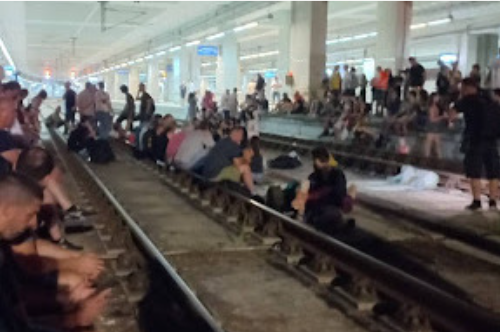This article is part of our collaboration with International Policy Review at IE University. You can read more articles in this series at the link just above.

Credit: Author
By Ljubica Ognjenović. Edited by Matilde Romagnoli.
Civil movements have not been few nor far between in modern-day Europe, but one seems to have gone almost entirely unnoticed by the international community.
The roots of the crisis originate as early as 2004, when jadarite, a mineral with high lithium content, was discovered. Jadarite originates from the fertile Jadar Basin in the west of Serbia and is a chemically unique compound, compared to Kryptonite due to its structure. Unlike its citizens, the Serbian government has been open to hearing about new mining opportunities. The discovery drew the attention of international mining companies, including Rio Tinto.
Rio Tinto is an Anglo-Australian mining company established in 1873. Its name originates from the river of the same name in Spain, which has been permanently polluted by high levels of heavy metal sulfides from centuries of mining. The company has been at the center of many international scandals, most notably their reckless approach to Aboriginal lands which led to the ruin of a 40,000-year-old cave.
The company, registered in Serbia under Rio Sava, started buying land from its original owners around 2021. When many of the Basin’s citizens resisted, citing not only the area’s agricultural potential but also how it’s been cared for by generations of their family, the company turned to the government.
Instead of supporting the citizens’ demands to pull the plug on the project, the government, dominated by the Serbian Progressive Party (SNS) since 2012, attempted to amend its expropriation law to say that the government may expropriate land for whatever it deems to be “of national interest”. This would have forced families of the valley out of their fatherland “for the national good”.
The public reacted with mass protests in the country’s capital, Belgrade. The proposed amendments were eventually withdrawn, with Serbian President Aleksandar Vučić saying that he did not intend on “ruining more lives than the original plan supposed.” This led to opposition media raising the question of just how many lives were meant to be ruined.
These protests were covered by international media, including the BBC branch in Serbia, Al Jazeera, and Radio Free Europe. Even Novak Đoković, the world-class tennis player, supported the protests on his Instagram story.
Due to the sheer number of people involved reaching what Dr. Savo Manojlović, head of the non-governmental organization behind the ecological protests (Kreni-Promeni), called “a critical mass”, President Aleksandar Vučić announced that he would put a stop to the Rio Tinto project altogether. He did so in December 2021 by annulling the project plan for the Loznica municipality (at the center of the basin) though he did not address the demands for the permanent ban.
Nonetheless, the citizens of the Basin reported continued pressures to sell their properties. Under the leadership of Kreni-Promeni (which branches out to various areas of civil action, but is most notably involved in ecological issues), over 38,000 signatures were collected as part of the national initiative to ban the mining of lithium and borate (another mineral that has caused severe damage to the east of the country).
According to Serbian Law, if any entity collects over 30,000 signatures in under 30 days, its proposition has to be discussed by the Parliament. Instead, since Kreni-Promeni submitted the documentation, parliamentary staff have been claiming that it has been “displaced”. No further explanations have been given as to how the documents could have disappeared once given to the Parliament staff. Pressures on the residents continued, and international executives continued living in Serbia. After weeks of marches around the Presidential Residence, the Parliament, and the national television station, some of the citizens of the valley organized a multi-day protest camp in front of the Presidential Building.
Earlier this year, President Vučić spoke on Pink TV, one of the national networks, and said that he regretted pulling out of the project, and suggested it would return.
The pushback was even stronger this time, with citizens organizing protests and railroad blockades, though with less international press coverage. In the lead-up to the announced blockades, some of the organizers from informal ecological societies of other areas with mining issues and organizers were taken into custody and questioned. They later described this as an attempt to scare them into submission.
On the biggest blockade of two main Belgrade train stations, supported by the Jadar citizens, the NGO sector, and student associations, police forcefully removed the people from the railroad and arrested three prominent organizers – Ivan Bjelić and Nikola Ristić, who chained themselves to the rails, and Jevđenije Julijan Dimitrijević, who tried to talk them out of it.
Since the reinstatement of the plan, the company has been promising minimal ecological effects and prosperity, though scientists find this highly unlikely. Dr Dragana Đorđević warned that the sulfuric acids used in mining and cleaning the ore would cause irreparable damage not just to the Basin, but to the rest of the country to which it is connected via riverbeds. In addition, economists calculated that the overall improvement in living standards would amount to 2.6 euros per capita, a claim denied by the company. In comparison, USDA reports that Serbian agricultural exports amounted to $4.1 billion (3.7 billion euros), suggesting that agriculture is a significant aspect of Serbian profit. In the aftermath of agricultural protests across Europe, the importance of listening to the workers in this field seems more beneficial than ever before.
Serbia has been divided on many issues, from who should hold office, to how religious beliefs should be displayed in a (constitutionally) secular country, but has so far been united in attempts to ensure Rio Tinto stays out of the Jadar Basin.
Interestingly, in his July visit to Belgrade, German Chancellor Olaf Sholz expressed his support for the mining project, with the implication that the mined lithium would be exported to Germany to produce batteries for electric vehicles. This illustrates that not even an EU candidate (which Serbia is) is safe from the invasion of foreign interests.
Recently, the Dean and management of the Public Electro-Technical Faculty of the University of Belgrade resigned after being pressured to support the mining.
On October 10, 2024, Parliament once again rejected the proposal to ban mining in a closed voting, and civil societies have announced a new series of protests.
With the recent lack of success in fulfilling the demands of protests, it appears that international support would be needed, not just from the NGO sector, but from the official institutions as well. Citizens, already discouraged by multiple series of failed political protests against ecological neglect, electoral corruption, and violence, seem to be losing hope. Support from the European Union for its candidate country remains lacking despite discussions on the problem in the European Parliament.
In a time of world-wide political uncertainty, attempts of what can only be described as modern-day economic colonization should not go unnoticed, especially when they are happening at the very heart of Europe, and its consequences could affect far more than just the citizens of Jadar.
And if the battle is lost, who is to say that these companies will not eventually gain enough financial and lobbying power to permeate into more powerful states? If no action is taken, we can look forward to a global ecological crisis as unethical mining companies spread their influence.
Other posts that may interest you:
Discover more from The Sundial Press
Subscribe to get the latest posts sent to your email.




